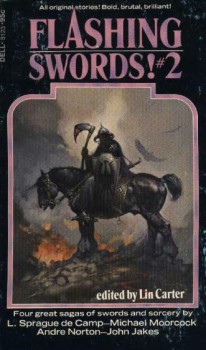The Barbarism of Bullfighting and Archaic Diction in L. Sprague de Camp’s “The Rug and the Bull”

One of the many freedoms of Sword and Sorcery, it seems to me, is that it enables the adoption of a world that allows the writer to comment on just about anything on which one would want. One of Robert E. Howard’s purposes in the construction of his own Hyboria was to create a conglomerate of cultures, no matter how anachronistic their juxtapositions, so that his hero Conan might have any kind of adventure that Howard might think up. Whereas for previous tales, Howard perhaps had to construct different heroes for different historical epochs (Bran Mak Morn for the Celtic Picts, Solomon Kane for the sixteenth century, Kull for Atlantis), in the Hyborian Age Conan might be a thief, a soldier, a pirate, and ultimately a king, his adventures all the while providing Howard with powerful commentary on “civilization.”
So, too, writers after Howard have utilized this purpose. Dave Sim, through his creation of Cerebus the Aardvark, begins by commenting on the Sword and Sorcery genre itself (as well as the mainstream comic books of Sim’s time) and then goes on to explore High Society, Church & State, marriage – and this last, in Jaka’s Story, is as far as my reading has taken me, but I understand that Sim is so far reaching in his exploration of topics that in a much later volume he even explores the life and works of Ernest Hemingway through Cerebus taking on the position of Hemingway’s personal secretary!
Terry Pratchett uses the Sword and Sorcery milieu to ingenious satirical effect, cribbing directly (I believe) from Fritz Leiber in order to forecast to his readers, in the very first pages of the very first Discworld novel, just what tone and material his readers may expect. Pratchett’s initial perspective characters, soon abandoned, are Bravd and the Weasel (Fafhrd and the Gray Mouser, obviously). I quote the following description in order to give an example of Pratchett’s satirical treatment of Sword and Sorcery and to underscore, specifically, Pratchett’s debt to Leiber. For more humor, one might want to pick up this book and enjoy the way that these characters talk to each other – it’s impressively Leiberesque.